
Unlocking the Future: The Promise and Potential of Bitcoin ETFs in Mainstream Investment
Bitcoin ETFs: Catalyzing Institutional Participation
Following a period of subdued engagement triggered by the collapse of major crypto players like FTX during the extended crypto winter of 2022, the momentum within the crypto sector has witnessed a rejuvenation. Bitcoin, alongside various other cryptocurrencies, languished through a phase of lackluster trading as regulatory scrutiny enveloped multiple crypto exchanges. However, a transformative shift was catalyzed by the news that industry powerhouses such as BlackRock, Fidelity, and Valkyrie were vying for approval to introduce spot Bitcoin ETFs, effectively reigniting investment enthusiasm in the crypto realm
While institutional contenders had previously submitted spot Bitcoin ETF proposals to the United States Securities and Exchange Commission (SEC), these initiatives had met with varying outcomes, ranging from withdrawal to outright rejection. A milestone was marked with the SEC’s approval of the inaugural Bitcoin futures ETF, the ProShares Bitcoin Strategy ETF, in October 2021—a significant stride toward mainstream acceptance.
Institutional Entrants and the Balancing Act
The pivotal move by asset management titan BlackRock to file a spot Bitcoin ETF application with the SEC has reshaped the landscape, elevating the probability of the regulatory green light. Industry expert Eric Balchunas from Bloomberg posits a 50% likelihood of BlackRock’s spot Bitcoin ETF securing approval—an event that could be transformative for the industry. The subsequent wave of ETF filings initiated by BlackRock on June 16 spurred a cascade of similar applications from WisdomTree, Invesco, Valkyrie, and others. A total of seven institutional heavyweights have now embarked on the journey to establish spot Bitcoin ETFs.
Industry pundits predict the period spanning 2023 to 2024 to be pivotal in securing spot Bitcoin ETF approval. Chief Strategy Officer of Bitrue, Robert Quartly-Janeiro, underscores the economic backdrop marked by surging inflation, intricate money supply dynamics, and elevated interest rates—a fertile environment for cryptocurrencies to flourish. Despite market volatility, institutional faith in cryptocurrencies remains resolute. The influx of institutional investors into the crypto landscape has expanded significantly compared to a mere year ago. Even trailblazers like MicroStrategy, who temporarily suspended their Bitcoin acquisitions, have reignited their involvement, actively accumulating Bitcoin in 2023.
Balancing Risk and Reward
The Chief Technology Officer at Bitfinex, Paolo Ardoino, underscores Bitcoin’s enduring value as a safeguard against devaluation—a sentiment echoed by traditional financial institutions. The upsurge in applications for Bitcoin spot market ETFs reflects a burgeoning demand from both investors and issuers, signifying a broader institutional momentum towards embracing Bitcoin.
The reticence exhibited by institutions over the past year was partially catalyzed by events like the FTX incident and subsequent banking challenges. The evolving regulatory terrain is paving the way for institutions to reevaluate their stance and cautiously re-enter the crypto space.MicroStrategy’s unwavering commitment to Bitcoin stands as a testament to institutional leadership. CEO Michael Saylor’s resolve to continue accumulating Bitcoin, even amid price turbulence, underscores the significance of institutional conviction.
Institutional Push and Market Resurgence
The resurgence of institutional interest rekindles optimism for a potential new bull run. In the prior bullish trajectory of 2020 to 2021, institutional investments were instrumental, with companies like MicroStrategy and Tesla integrating Bitcoin into their balance sheets. The collective impact of institutional and retail interest is poised to amplify the growth of cryptocurrency market capitalization.
The potential approval of BlackRock’s ETF application introduces the prospect of doubling Bitcoin’s value. This anticipated move not only intensifies institutional interest but also augments competition among financial entities, channeling increased funds from traditional markets into the crypto domain. Alongside institutional momentum, regulatory advancements in markets like Hong Kong open avenues for broader retail participation, offering a diverse spectrum of drivers for the impending bull run.
Bitcoin Halving and Institutional Propulsion
With Bitcoin’s halving event scheduled for April 2024, institutional engagement assumes a pivotal role in shaping the future crypto landscape. Historical patterns underscore that bull runs often coincide with halving events—a phenomenon attributed to the scarcity-driven price surge as investors, both institutional and retail, seek to bolster their Bitcoin portfolios.
Open your free digital wallet here to store your cryptocurrencies in a safe place.
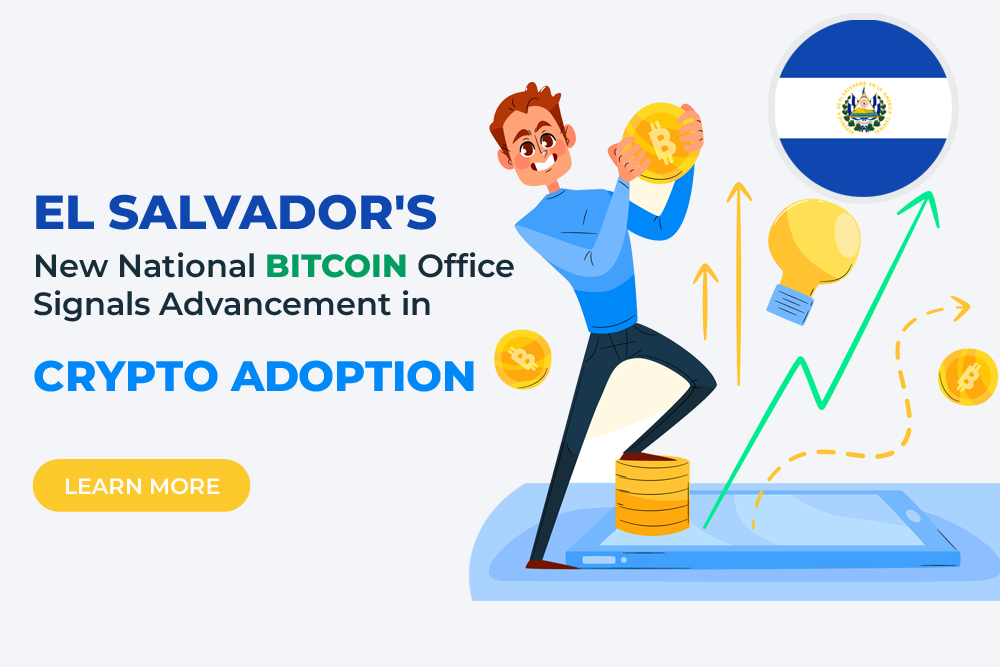
Saifedean Ammous Joins El Salvador’s National Bitcoin Office as Economic Advisor
El Salvador’s commitment to embracing Bitcoin as legal tender continues to make waves in the crypto industry. In a significant development, Saifedean Ammous, the renowned economist and author of “The Bitcoin Standard,” has joined the National Bitcoin Office of El Salvador as an economic advisor. This strategic move highlights the country’s determination to leverage the potential of cryptocurrencies and promote financial innovation. Ammous has shared his insights on El Salvador’s Bitcoin strategy, expressing optimism about the country’s potential for economic growth and debt reduction. This article delves into Ammous’s role, his views on El Salvador’s initiatives, and the broader implications for cryptocurrency adoption.
Ammous’s Vision for El Salvador
In an interview with the local newspaper ‘Diario El Salvador,’ Ammous expressed confidence in El Salvador’s ability to become debt-free within the next five to ten years. He emphasized the country’s immense potential to become a hub of innovation, owing to its progressive policies, including the adoption of a zero tax rate for technology companies. Ammous commended President Nayib Bukele’s initiatives, highlighting their attractiveness compared to nations adopting contrasting cryptocurrency taxation policies. Although not explicitly mentioned, Ammous alluded to recent debates on cryptocurrency taxation in countries such as the United States, the United Kingdom, Portugal, and Italy. El Salvador’s commitment to creating a favorable environment for businesses and entrepreneurs positions it as a leader in the global crypto landscape.
The Role of the National Bitcoin Office
The National Bitcoin Office, established through Decree No. 49, has been pivotal in driving El Salvador’s cryptocurrency strategy. Its formation last year involved collaboration between President Bukele and prominent Bitcoin supporters Stacy Herbert and Max Keiser. The office plays a central role in overseeing cryptocurrency-related matters in the country, ensuring regulatory clarity, and facilitating the integration of Bitcoin into the economy. Ammous’s appointment as an economic advisor adds another layer of expertise to the office, enhancing the President’s decision-making process. Notably, Ammous has volunteered his services without requesting financial compensation, underscoring his commitment to advancing the adoption of cryptocurrencies in El Salvador.
El Salvador’s Pioneering Initiatives
El Salvador has been a trailblazer in its national cryptocurrency strategy. It became the first country to adopt Bitcoin as legal tender in September 2021, signaling a major milestone in the mainstream acceptance of cryptocurrencies. Furthermore, the introduction of innovative Bitcoin bonds last year demonstrated El Salvador’s commitment to harnessing the potential of digital assets to stimulate economic growth. While initial reports on Bitcoin adoption in the country varied, recent trends indicate an upsurge in uptake, fueled in part by increased tourism. El Salvador’s proactive approach to cryptocurrency integration has attracted global attention and positioned the nation as a vanguard of financial innovation.
US Regulatory Developments
The United States, a global powerhouse in finance and technology, has recently witnessed significant regulatory discussions surrounding cryptocurrencies. President Joe Biden’s administration proposed imposing excise taxes on Digital Asset Mining Energy (DAME), which could have subjected cryptocurrency mining companies to a 30% tax. However, as part of the agreement reached on the US debt ceiling, this tax proposal is currently being blocked. The Biden administration argued that such taxes were necessary to address the environmental and social impacts of mining operations. The ongoing debates on cryptocurrency taxation highlight the contrasting approaches countries are taking toward digital assets, further emphasizing the significance of El Salvador’s progressive stance.
Conclusion
Saifedean Ammous’s appointment as an economic advisor to El Salvador’s National Bitcoin Office marks a significant milestone in the country’s journey towards cryptocurrency adoption. His expertise and insights will undoubtedly contribute to shaping the nation’s economic strategies and further solidify its position as a leader in the crypto industry. With Ammous’s guidance, El Salvador is poised to achieve its ambitious goals, including debt reduction and the establishment of an innovative hub for cryptocurrency innovation.
As El Salvador continues to implement its progressive cryptocurrency policies, other nations around the world are closely observing the outcomes. The country’s pioneering initiatives, such as adopting Bitcoin as legal tender and creating a supportive regulatory framework, have attracted attention and sparked conversations about the future of finance. El Salvador’s bold approach serves as an inspiration for countries grappling with the challenges and opportunities presented by digital currencies.
Furthermore, the collaboration between the National Bitcoin Office and Saifedean Ammous underscores the importance of bringing together diverse expertise to drive meaningful change. As cryptocurrencies gain traction and reshape the global financial landscape, the input of renowned economists like Ammous becomes invaluable in navigating the complexities of this evolving ecosystem. To conclude, Saifedean Ammous’s role as an economic advisor to El Salvador’s National Bitcoin Office adds a new dimension to the country’s cryptocurrency journey. With his expertise and insights, coupled with El Salvador’s progressive initiatives, the nation is poised to make significant strides in leveraging the potential of cryptocurrencies for economic growth and financial empowerment. As the global community watches El Salvador’s progress, it is clear that the country’s commitment to innovation and inclusion has the potential to reshape the future of finance.
Open your free digital wallet here to store your cryptocurrencies in a safe place.

Flared Methane as a Sustainable Power Source for Cryptocurrency Mining
In recent years, the cryptocurrency mining industry has experienced tremendous growth. With the rise of Bitcoin and other digital currencies, mining has become a popular way to earn a profit by using specialized hardware and software to solve complex mathematical equations.
The Potential of Flared Methane in the Mining Industry
One area of potential growth in this industry is the use of renewable energy sources to power mining operations. As concerns about climate change continue to rise, many miners are looking for ways to reduce their carbon footprint and increase sustainability.
One type of renewable energy that has caught the attention of miners is flared methane. Flared methane is a byproduct of oil drilling, and it is often burned off because it is considered a waste product. However, this gas can be harnessed and used to generate electricity, which can then be used to power mining operations.
Companies Leading the Way in Flared Methane Mining
Several companies have already begun exploring the potential of flared methane as a power source for mining. For example, Upstream Data, a Canadian company, has developed a mobile mining rig that can be powered by flared methane. This rig is designed to be easily transportable and can be deployed to remote locations to take advantage of flared methane sources.
Another company, Crusoe Energy Systems, has developed a system that captures flared methane and converts it into electricity. This electricity is then used to power mining rigs that are located on-site. Crusoe’s system has already been deployed in several locations in the United States, and the company has plans to expand its operations in the coming years.
Overcoming Challenges in the Use of Flared Methane
The potential of using flared methane to power mining operations is significant. According to a report by the World Economic Forum, flared methane could provide enough energy to power up to 8,000 mining rigs. This would not only reduce the environmental impact of mining but could also provide a significant economic opportunity for the oil and gas industry.
However, there are also some challenges associated with using flared methane as a power source. One of the biggest challenges is the variability of methane flaring. Flaring rates can change rapidly, making it difficult to ensure a consistent supply of power. This can result in downtime for mining operations, which can be costly for miners.
Another challenge is the logistics of transporting and storing the gas. Flared methane is often located in remote areas, which can make it difficult and expensive to transport. Additionally, storing the gas can be challenging, as it requires specialized equipment and safety protocols.
Despite these challenges, the potential of using flared methane to power mining operations is significant. As the cryptocurrency mining industry continues to grow, the demand for renewable energy sources will only increase. Flared methane has the potential to not only provide a sustainable energy source for mining but could also provide economic benefits for the oil and gas industry.
The Future of Flared Methane as a Sustainable Power Source
As the industry continues to develop, it is likely that we will see more companies exploring the potential of flared methane as a power source for mining. With the right technology and infrastructure in place, this could be a game-changer for the industry, providing a sustainable and cost-effective solution for powering mining operations.
In conclusion, the use of renewable energy sources is becoming increasingly important in the cryptocurrency mining industry. Flared methane is one such source that has the potential to provide a sustainable and cost-effective solution for powering mining operations. While there are challenges associated with using this gas, the potential benefits are significant, and it is likely that we will see more companies exploring this option in the coming years.
Open your free digital wallet here to store your cryptocurrencies in a safe place.

ZeroSync and Blockstream Partnership: Broadcasting Bitcoin Zero-Knowledge Proofs from Space for Secure Transactions
ZeroSync and Blockstream have announced a new partnership to broadcast Bitcoin zero-knowledge proofs from space, marking a major milestone in the world of cryptocurrency. The two companies have joined forces to create a satellite network that will transmit zero-knowledge proofs, which allow for secure and private transactions without revealing any sensitive information.
What are Zero-Knowledge Proofs and Why Are They Important for Bitcoin?
The ZeroSync Association, a newly formed organization that focuses on advancing zero-knowledge proof technology in the Bitcoin ecosystem, will oversee the project. The association is made up of several leading Bitcoin developers, including those from Blockstream, and is dedicated to exploring and implementing innovative solutions to improve the security and privacy of Bitcoin transactions.
The Benefits of Broadcasting Zero-Knowledge Proofs from Satellites
Zero-knowledge proofs are a cryptographic technique that allows one party to prove to another that they possess certain knowledge or information, without revealing that knowledge or information itself. This technique can be used to verify that a transaction has taken place without revealing any details about the transaction itself, such as the amount involved or the identities of the parties involved.
The Role of ZeroSync Association in Advancing Zero-Knowledge Proof Technology
The use of zero-knowledge proofs has been touted as a key solution for improving the privacy and security of Bitcoin transactions, which are currently visible to anyone who has access to the blockchain. By using zero-knowledge proofs, transactions can be made private, preventing anyone from accessing information about the transaction without the necessary keys.
The partnership between ZeroSync and Blockstream aims to take this one step further by broadcasting zero-knowledge proofs from space. The use of satellites to transmit these proofs will provide an added layer of security, as it will make it much more difficult for hackers or other malicious actors to intercept the transmissions.Aside from the security advantages, the use of satellites has the potential to improve the speed and dependability of Bitcoin transactions. Transactions can currently take several minutes or even hours to confirm, depending on network congestion and fees paid. Transactions may be confirmed considerably more quickly by employing satellites to broadcast zero-knowledge proofs, making Bitcoin more practical for everyday use.
The Future of Bitcoin and Cryptocurrencies with Innovative Partnerships
The partnership between ZeroSync and Blockstream has already garnered a lot of attention within the cryptocurrency community, with many experts praising the move as a significant step forward for Bitcoin. However, some have also raised concerns about the potential cost and complexity of the project, as well as the potential for regulatory issues. Despite of these concerns, it appears evident that the usage of zero-knowledge proofs and satellite technology will play a growing role in the future of Bitcoin and cryptocurrencies in general. As the world grows more digital and networked, it is more critical than ever to protect the security, privacy, and dependability of our financial transactions.
In conclusion, the partnership between ZeroSync and Blockstream to broadcast Bitcoin zero-knowledge proofs from space is an exciting development for the cryptocurrency industry. By using zero-knowledge proofs and satellite technology, transactions can be made more private, secure, and efficient, paving the way for a more practical and widely adopted cryptocurrency. While there are still challenges to overcome, the future of Bitcoin looks brighter than ever thanks to innovative partnerships like this one.
Open your free digital wallet here to store your cryptocurrencies in a safe place.

The First Bitcoin Transaction: A Pivotal Moment in Cryptocurrency History and its Impact on the World Today
A revolutionary digital asset, Bitcoin has captured the attention of the world since its creation in 2009. One particularly noteworthy moment in its journey is the first ever Bitcoin transaction. On January 12, 2009, the creator of Bitcoin, Satoshi Nakamoto, sent a transaction to computer scientist and cryptographer, Hal Finney. This transaction marked the beginning of Bitcoin’s journey from being a digital asset with no real-world value to the widely accepted and valuable cryptocurrency it is today.
The Beginnings of Bitcoin Adoption
Hal Finney, the recipient of the first Bitcoin transaction from Satoshi Nakamoto, was an early Bitcoin enthusiast and developer. He was one of the first people to understand the potential of digital currency and was an active contributor to the development and testing of the Bitcoin software. He was an early adopter of the technology and supported the growth of the network. He was also the first person to run a bitcoin client on his computer and famously tweeted “Running bitcoin” on January 11th, 2009.
He was a pioneer in the field and was one of the first people to understand the potential of Bitcoin. He was also an active member of the cypherpunk community and was involved in the development and testing of the Bitcoin software.
In addition, Hal Finney’s tweet “running bitcoin” on January 11, 2009, is considered as one of the first public demonstrations of the software and it was a significant moment in the early days of Bitcoin. His tweet is considered as the first recorded evidence of the successful running of the software and the first recorded instance of Bitcoin mining.
Before this transaction, Bitcoin was used primarily as a digital asset, with no real-world value. Satoshi’s transaction to Hal marked the first time Bitcoin was used to transfer funds, and it marked a significant milestone in the cryptocurrency industry. It demonstrated the potential of Bitcoin as a medium of exchange and sparked the interest of many other early adopters. Hal Finney’s early involvement and support were essential in laying the foundation for the cryptocurrency’s success. He was a vocal advocate for Bitcoin and helped to promote its growth and adoption.
The Growth and Evolution of Bitcoin
The first-ever Bitcoin purchase was made by a man named Laszlo Hanyecz on May 22, 2010, who bought two pizzas for 10,000 BTC. This transaction is now celebrated annually as ‘Bitcoin Pizza Day‘ by Bitcoin enthusiasts worldwide.
Since then, Bitcoin has grown in popularity, with millions of people around the world now using it as a means of exchange and store of value. The cryptocurrency industry has evolved significantly over the last decade and continues to grow at an unprecedented rate. The value of Bitcoin has gone from being worth a few cents to reaching an all-time high of over $60,000 per coin. It has also sparked the creation of thousands of other digital currencies, known as altcoins.
The growth of Bitcoin is still far from over. It has become a household name and has attracted the attention of investors, businesses, and governments worldwide. Bitcoin has also played a crucial role in the development of blockchain technology, which has the potential to revolutionise various industries.
Conclusion
Bitcoin’s journey so far has been nothing short of remarkable. From the first transaction sent by Satoshi Nakamoto to Hal Finney, to the widespread acceptance and adoption of the digital currency, Bitcoin has come a long way. The significance of that first transaction cannot be overstated; it was the start of a journey that has led to the creation of a new asset class and a new way of thinking about money.
The first Bitcoin transaction was a pivotal moment in the history of cryptocurrency. Hal Finney, the recipient of the first transaction, was one of the first people to understand the potential of Bitcoin.
Open your free digital wallet here to store your cryptocurrencies in a safe place.
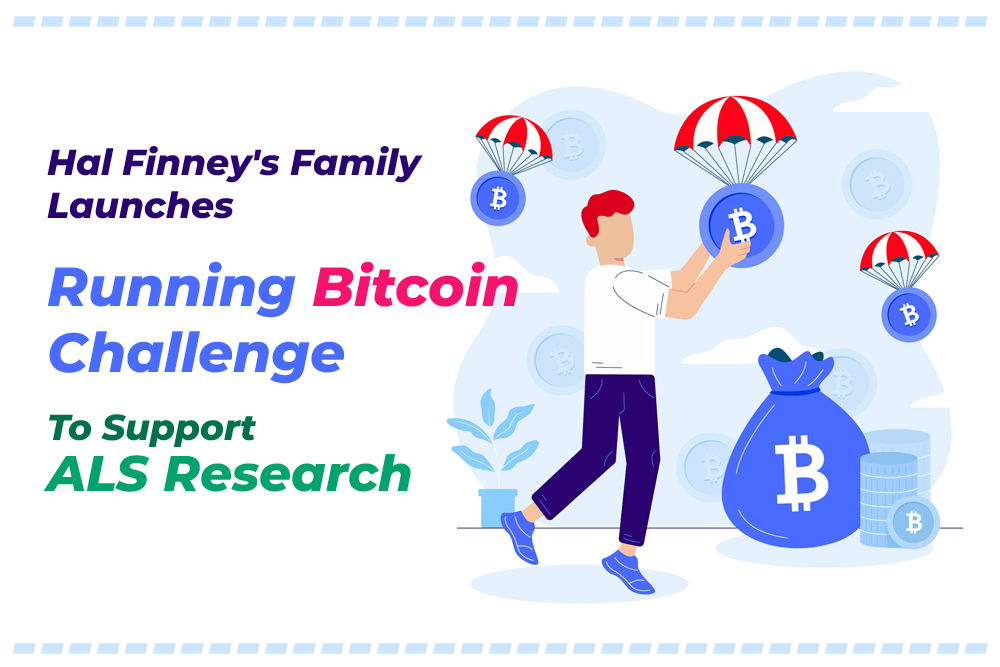
Hal Finney’s Family Launches ‘Running Bitcoin Challenge’ to Support ALS Research
The Running Bitcoin Challenge: Honoring Hal Finney’s Memory and Supporting the Fight Against ALS
Hal Finney was a renowned computer scientist and cryptocurrency developer known for his contributions to the development of Bitcoin. In 2008, he received the first-ever Bitcoin transaction from Satoshi Nakamoto, the pseudonymous creator of Bitcoin. Tragically, Finney passed away in 2014 due to complications from Amyotrophic Lateral Sclerosis (ALS), also known as Lou Gehrig’s disease.
A Half Marathon Fundraiser for a Good Cause
In honor of Finney’s legacy, his spouse Fran Finney has organized the Running Bitcoin Challenge, a half marathon fundraiser that takes place between January 1 and January 10 each year. Finney was an avid runner before being diagnosed with ALS in August 2009. Despite a long battle with the disease, he was cryonically preserved in 2014. The Running Bitcoin event serves as a way to honor his memory and raise funds for an important cause. Those who donate at least $100 will receive an official Running Bitcoin T-shirt, and the top 25 fundraisers will receive a rare Hal Finney collectible.
The First Bitcoin Transaction and a Tweet That Changed the World
This timing coincides with the anniversary of Hal Finney’s famous “Running Bitcoin” tweet, in which he announced that he was contributing to the code to the Bitcoin codebase in 2008 and early 2009, and he was the recipient of the first-ever Bitcoin transaction, in which Satoshi Nakamoto sent him 10 BTC. Finney was a pioneer in the field of computer science and a strong advocate for privacy and civil liberties. His work in these areas continues to inspire others to fight for these values.
A Decentralized Event That Can Be Participated in From Anywhere
Participants in the Running Bitcoin Challenge can run, walk, roll, or hike the equivalent of a half marathon (Finney’s favorite distance) either in one go or over the entire 10-day period. There is no set location for the challenge, so participants can join from anywhere they wish. Those who donate at least $100 will receive an official shirt with the half marathon’s logo, and the top 25 fundraisers will receive a Hal Finney collectible signed by his wife. The Running Bitcoin Challenge serves as a way to honor Finney’s memory and raise funds for the important cause of finding a cure for ALS.
The Running Bitcoin Challenge has been a successful fundraiser, raising hundreds of thousands of dollars for ALS research. In addition to supporting research, the challenge also serves as a way for people to honor Finney’s memory and pay tribute to his contributions to the world of cryptocurrency.
Support the Cause and Honor Hal Finney’s Memory
By participating in the Running Bitcoin Challenge and raising funds for ALS research, individuals can help make a difference in the fight against this devastating disease and honor Finney’s memory at the same time. The event is being held in cooperation with the ALS Association Golden West Chapter, which provides equipment loans and educational materials to people living with ALS.
One of the unique aspects of the Running Bitcoin Challenge is that it is a decentralized event, meaning that it can be participated in from anywhere in the world. This makes it accessible to people from all walks of life and allows for a diverse group of participants to come together in support of the cause.
Overall, the Running Bitcoin Challenge is a unique and meaningful way to honor the memory of Hal Finney and support the fight against ALS. It is an opportunity for the cryptocurrency community to come together and make a difference in the world.
Open your free digital wallet here to store your cryptocurrencies in a safe place.
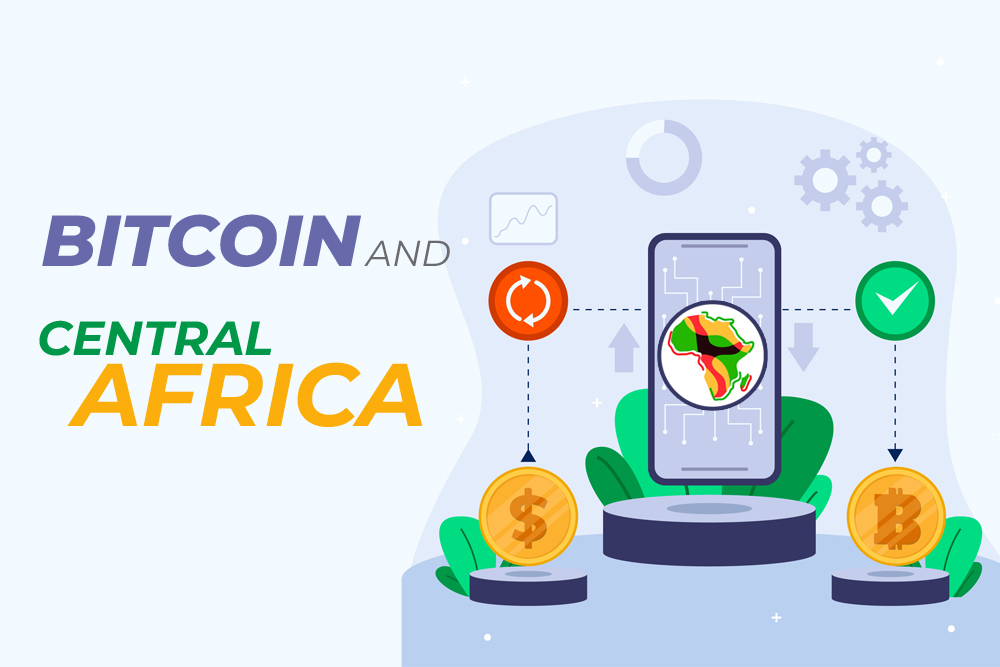
Central Africa Embraces Bitcoin and Cryptocurrency Adoption for Economic and Political Stability
Bitcoin, the world’s first decentralized digital currency, has seen growing adoption in Central Africa in recent years. This trend is driven by a number of factors, including the region’s high inflation rates, political instability, and lack of access to traditional banking services.
One of the main reasons for the adoption of Bitcoin in Central Africa is the high inflation rates that many countries in the region face. Inflation erodes the purchasing power of a currency, making it difficult for people to save and plan for the future. By using Bitcoin, which is not subject to inflation, individuals and businesses in Central Africa can protect their wealth and preserve its value over time.
Political instability is another factor driving the adoption of Bitcoin in Central Africa. Many countries in the region have a history of coups, civil wars, and political unrest, which can lead to the confiscation of assets and bank accounts. By using Bitcoin, which is decentralized and not controlled by any government or institution, individuals and businesses in Central Africa can protect their assets from seizure and avoid the risks associated with political instability.
In addition to high inflation and political instability, many people in Central Africa lack access to traditional banking services. In some rural areas, there are no banks or financial institutions, making it difficult for individuals and businesses to access credit, save money, and make payments. By using Bitcoin, which can be easily accessed and used with a smartphone and internet connection, people in Central Africa can enjoy many of the same benefits of traditional banking without the need for physical infrastructure.
The adoption of Bitcoin in Central Africa is also supported by a growing ecosystem of businesses and services that accept the cryptocurrency. This includes merchants who accept Bitcoin for goods and services, as well as exchanges and wallet providers that facilitate the buying and selling of Bitcoin. This ecosystem is helping to drive the adoption of Bitcoin and is making it easier for people in Central Africa to use the cryptocurrency in their daily lives.
In addition to the factors mentioned above, there are several other reasons why Bitcoin is gaining popularity in Central Africa. The increasing use of mobile phones and internet access in the region has made it easier for people to use Bitcoin and other digital currencies. The growing awareness of the benefits of Bitcoin, such as its decentralized nature, low transaction fees, and fast transaction times, has also contributed to its increasing popularity in the region. The growing adoption of Bitcoin in other parts of the world has also played a role in its acceptance in Central Africa.
Furthermore, the Central African Republic has recently unveiled its own cryptocurrency, Sango Coin, which will be the second cryptocurrency, after Bitcoin, to be recognized as legal tender in the country. The President of the Central African Republic has voiced support for blockchain, cryptocurrencies, and Bitcoin, further demonstrating the increasing interest and involvement in the cryptocurrency space in the region.
Overall, the adoption of Bitcoin in Central Africa is driven by a combination of economic, political, and technological factors. As the ecosystem of businesses and services that accept Bitcoin continues to grow, it is likely that the adoption of the cryptocurrency will continue to increase in Central Africa.
Open your free digital wallet here to store your cryptocurrencies in a safe place.
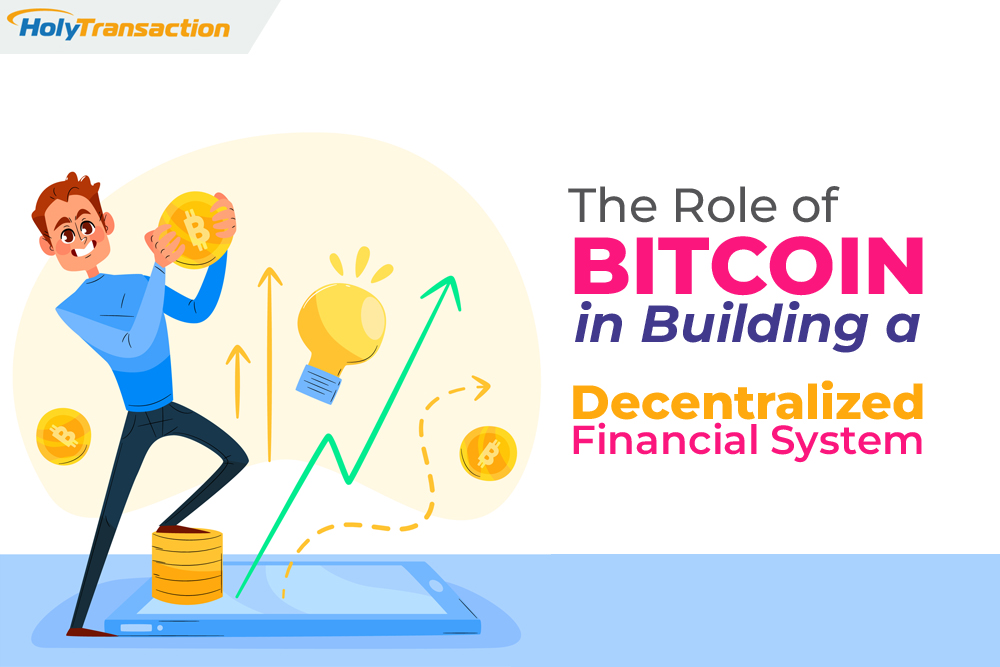
The Role of Bitcoin in Building a Decentralized Financial System
Bitcoin, the world’s first and most widely-used decentralized digital currency, has an important role in building a decentralized financial system. One of the key advantages of Bitcoin is its potential for appreciating in value, thanks to its limited and predetermined supply. This can make it a potentially attractive investment, as it may increase in value over time.
In addition to its potential for growth, Bitcoin offers security and transparency through its distributed ledger, the blockchain. This means that transactions on the network are almost impossible to cheat or make fraudulent, making it a secure option for conducting financial transactions.
Bitcoin’s decentralized nature also means that it is not subject to the same risks as traditional currencies, such as inflation or government seizure. This makes it a useful option for individuals in countries with unstable currencies or high inflation rates, as it allows them to store value and make payments in a more stable and secure way.
The rise of DeFi, or decentralized finance, has also seen the development of a number of projects built on top of the Bitcoin network. These include RSK and tBTC, which allow users to access a wide range of financial services in a decentralized and trustless manner.
The Lightning Network, another layer built on top of the Bitcoin network, also offers users the ability to make fast and cheap transactions. This can make transactions faster and cheaper, and can also enable new use cases such as micropayments and instant payments. One such wallet that integrates with the Lightning Network is HolyTransaction, which offers a wide range of digital assets and other benefits such as an easy-to-use interface and fast and cheap transactions.
A leading project is Blockstream’s Liquid Bitcoin, also known as L-BTC. Liquid Bitcoin is a sidechain-based token that is pegged to the value of Bitcoin, allowing users to transfer value between the two networks quickly and securely. The Liquid Network is a federated sidechain that uses a consortium of trusted nodes to provide increased privacy and security for users.
Another project that leverages the Liquid Network is Fuji Money, a Lightning-enabled non-custodial synthetic asset protocol. Fuji Money allows users to create and trade synthetic assets, such as stablecoins or synthetic commodities, on the Liquid Network in a trustless and decentralized manner. This allows users to access a wider range of financial instruments and services, further expanding the capabilities of the decentralized financial system.
Overall, the role of Bitcoin in building a decentralized financial system is significant, thanks to its potential for appreciation in value, security and transparency, and ability to provide financial inclusion.
Open your free digital wallet here to store your cryptocurrencies in a safe place.

How bitcoin can help you take control of your financial future
Bitcoin is a decentralized digital currency that has gained popularity in recent years for conducting online transactions. HolyTransaction is proud to offer our users the benefits of using this innovative digital currency, including security, low transaction fees, and greater control over one’s own cryptocurrencies.
One of the key advantages of using Bitcoin for online transactions is its decentralized nature. This makes it a secure option for conducting transactions and protects against the potential for a single point of failure. In addition, each transaction is verified by the network of computers that run the Bitcoin software, making it virtually impossible to forge or counterfeit.
Another benefit of using Bitcoin is its low transaction fees. Because there are no intermediaries such as banks or credit card companies involved in the process, transaction fees are typically much lower than they would be with traditional forms of payment. This can be especially beneficial for those who conduct a large number of transactions, such as small business owners or online merchants.
In addition to these benefits, using Bitcoin can also offer users more control over their own money. Because it is decentralized and not controlled by any one entity, users are free to store, send, and receive Bitcoin without interference from third parties. This can be especially valuable in countries where access to traditional financial services is limited.
Another potential benefit of using Bitcoin is its potential for growth. Because there is a limited supply of Bitcoins, and the demand for them is increasing, the value of the currency has the potential to increase over time. This makes it a potentially attractive investment option for those looking to grow their wealth.
Of course, there are also risks associated with using Bitcoin. The value of the currency can be volatile, and there have been instances of large-scale attacks on Bitcoin exchanges. However, these risks can be mitigated by taking steps to protect your Bitcoin wallet.
At HolyTransaction, we are committed to providing our users with a reliable platform for buying and selling Bitcoin. With a user-friendly interface and low fees, HolyTransaction is the perfect place to start your journey with Bitcoin and take control of your financial future.
In addition to our exchange services, we also offer a range of other tools and resources to help our users make the most of their Bitcoin experience. Our educational materials and support team can provide guidance and assistance for beginners, while our user-friendly trading options are ideal for those just starting out with Bitcoin.
We are constantly working to improve and expand our services to meet the needs of our users. This includes the addition of new cryptocurrencies and features, as well as ongoing efforts to enhance security and user experience.
At HolyTransaction, our goal is to make Bitcoin accessible and easy to use for everyone. Whether you are a beginner looking to get started with Bitcoin or just want an easy and secure way to buy and sell the digital currency, we have something for you. Join us on our mission to help you take
Open your free digital wallet here to store your cryptocurrencies in a safe place.
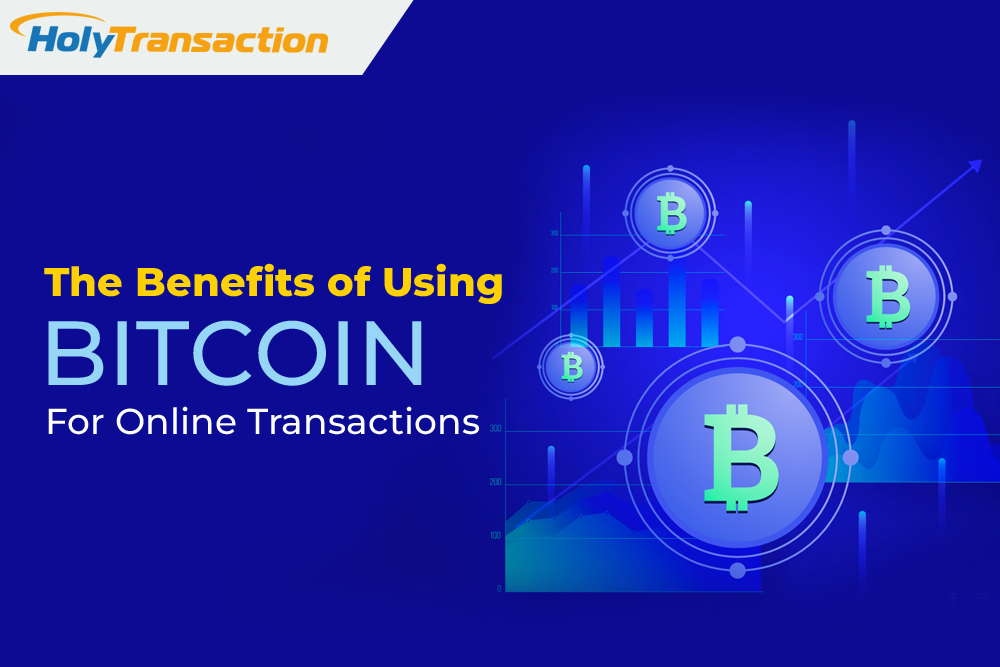
The Benefits of Using Bitcoin for Online Transactions
Bitcoin is a decentralized digital currency that has gained popularity in recent years for conducting online transactions. Unlike traditional currencies that are controlled by central banks, Bitcoin is not subject to the whims of any one entity, making it an attractive option for those looking to conduct transactions online.
One of the key benefits of using Bitcoin for online transactions is its security. Because it is decentralized, there is no central point of failure that attackers can target. In addition, each transaction is verified by the network of computers that run the Bitcoin software, making it virtually impossible to forge or counterfeit.
Another benefit of using Bitcoin for online transactions is its low transaction fees. Because there are no intermediaries such as banks or credit card companies involved in the process, transaction fees are typically much lower than they would be with traditional forms of payment. This can be especially beneficial for those who conduct a large number of transactions, such as small business owners or online merchants.
In addition to these benefits, using Bitcoin for online transactions can also offer users more control over their own money. Because it is decentralized and not controlled by any one entity, users are free to store, send, and receive Bitcoin without third parties.
Some other potential benefits of using Bitcoin for online transactions include:
Faster transaction times: Because Bitcoin transactions are processed on a decentralized network, they can be completed much more quickly than traditional bank transfers or credit card payments. This can be especially useful for people who need to make or receive payments quickly, such as when making an emergency purchase or receiving payment for a time-sensitive project.
Immutability: This means that once a transaction is recorded on the Bitcoin blockchain, it cannot be altered or deleted. This provides a high level of security, as it ensures that transactions cannot be tampered with or reversed without the consensus of the network. This feature also helps to prevent fraud, as it makes it difficult for someone to modify or falsify records. Overall, the immutability of the Bitcoin blockchain provides a level of trust and security for users of the network.
Greater global accessibility: Because it is decentralized and not tied to any specific country or currency, Bitcoin can be used for online transactions anywhere in the world. This can be especially helpful for individuals and businesses in countries with unstable economies or limited access to traditional financial institutions.
Overall, the use of Bitcoin for online transactions offers a number of potential benefits, including security, low transaction fees, and greater control over one’s own currency. As more businesses and individuals begin to recognize the potential of this cryptocurrency, its use is likely to continue to grow. In fact, the use of Bitcoin is already starting to become more widespread, with many online merchants and small business owners choosing to accept it as a form of payment.
One final note about using Bitcoin for online transactions is its potential environmental benefits. Because it uses a decentralized network of computers to verify transactions, it does not require the same energy-intensive processes as traditional money transfer services. In fact, many of the computers that run the Bitcoin network are powered by renewable energy sources, which can help to reduce its carbon footprint. This is in contrast to traditional financial systems, which often rely on fossil fuels and other sources of pollution. In this way, using Bitcoin for online transactions can not only provide security and convenience, but also contribute to a cleaner and more sustainable world.
Open your free digital wallet here to store your cryptocurrencies in a safe place.